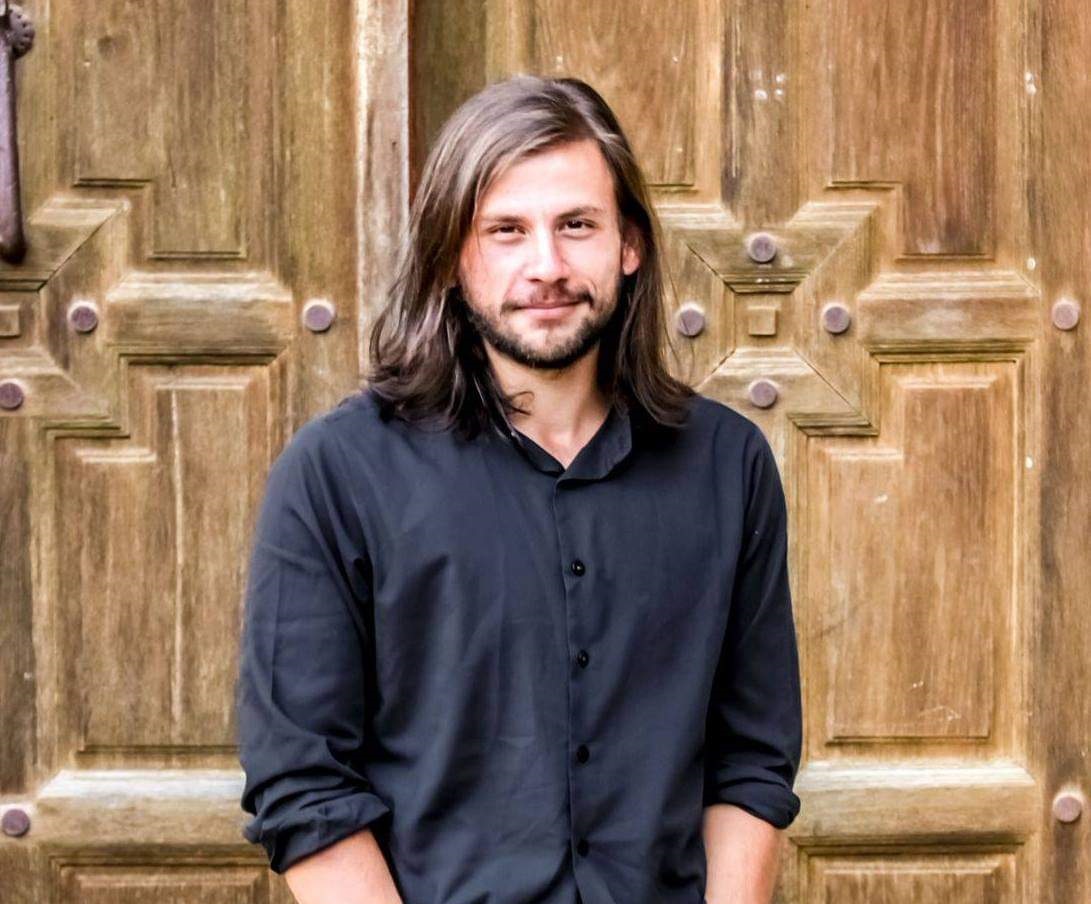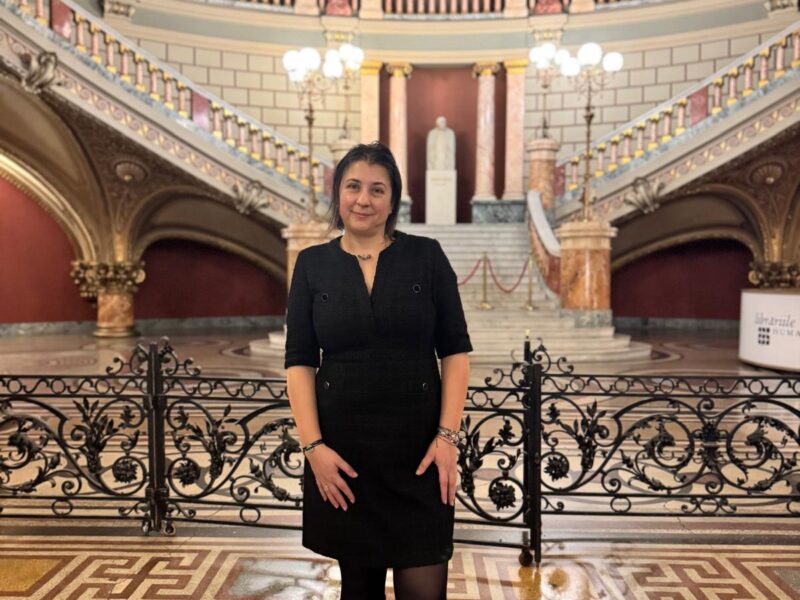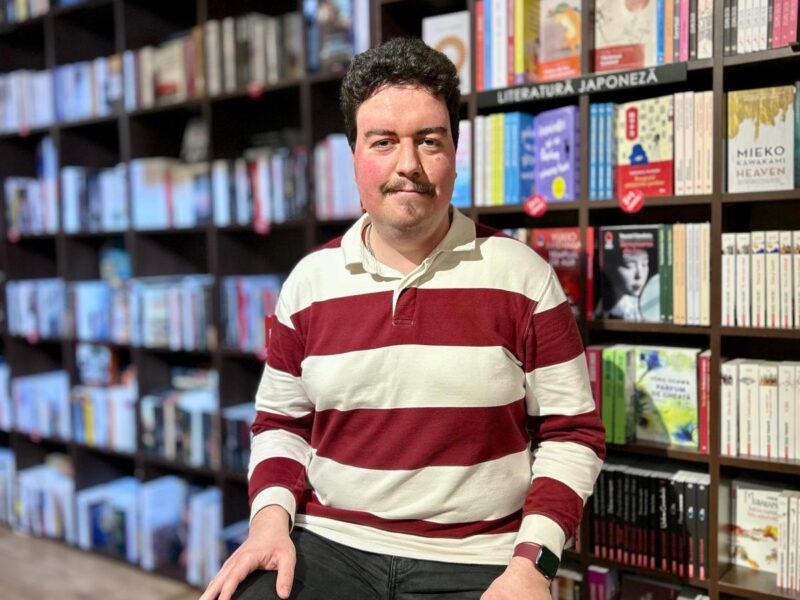Vlad Adăscăliței is senior book buyer at elefant.ro. He worked as a bookseller at Cărturești AFI and then at Humanitas Kretzulescu. He wrote book reviews for Postmodern. He wrote (and perhaps still writes) prose. He reads a lot, he sometimes wears mismatched socks. Because that is just how it happens. Or not.
Two of the books I read at your suggestion and which I remember are, and this could not have been more contradictory, The Dreamers (by Gilbert Adair) and Sophie’s World (by Jostein Gaarder). Who was the person who recommended you your first books, and what were the books?
I don’t necessarily remember a recommendation. But I started reading everything we had at home. Given that I have an older brother, he had books. My parents had books. I remember that we had Tolstoy’s illustrated stories, and all those things which came with the newspapers back in the day, Disney and other stuff like that, which I read and reread. Plus Legends of Olympus, Jules Verne, Winnetou, The Last of the Mohicans, The Three Musketeers, The Count of Monte Cristo, the classics. But my first real recommendation came when I started going to school and, at some point, in the second or the third grade, I went to the school library... It was my first time being in a library and I was very fascinated by everything there. The librarian saw me and, because she didn’t know that I had already been reading for quite a while (if they wanted to get rid of me, my parents just gave me a book and I disappeared in it for some time), she gave me an illustrated book, it had a few pages, its main character was a donkey. I took it and I started reading it as soon as I got home. I went back to the library on the same day and I told her: “I finished it!” My schoolteacher was also there and she saw the book I was holding and she told the librarian “Is this what you gave him to read? Give him something more...” The thing is, she didn’t know what I liked to read, and she took me to the children’s books section and told me “Look around, work it out...” I wasn’t too pleased, and then she said “Look, those are history books, don’t you like those?” That was when I started reading history books. Not for the dates and events, but for the fights, the beheadings, the overthrowing of kings, for all the intrigue there. It was the real version of Legends of Olympus . Up until the fifth grade, all I read was history books, so many that at some point I finished reading through the whole history shelf of the school library. I ended up at the school group contest for history, in the fourth grade, without necessarily wanting to be there. I began my career as a voracious reader with the history books from the school library.
What was the name of the donkey book, after all?
I have no idea, I only know that it was very bad. I mean, not very bad... But I didn’t enjoy it. We often underestimate children and we give them books about things we think they would like. “You’re young, read this!” This is how you lose them and you make them forget that reading and books can be fun. Especially now, when the competition with the internet dopamine megashot is strong.
And now, a recommendation, a book for adults?
I take my recommendations the same way I always did, from one book to another. So whenever I read a book, if I like it, I search for other things the author has written, or for what the author likes to read, from interviews and other things, or for books which are similar to that initial book. If I read articles written by people I like, I always make a mental note of the books they mention and I have probably always done that, I went from one book to another, far into other people’s shelves.
You said that a good part of your job involves the creation and the manoeuvring of Excels. What is the remaining part made of?
There is nothing else besides Excel. Excel is life! I’m kidding. After I pull my head out of my day-to-day Excels, I take care of everything else. I have to deal with the distribution chain from one end to the other. Practically, I interact with the people from the publishing house, from the sales department, the commercial department, marketing or PR, who want to promote the publishing house, to start campaigns. After I’m done with the publishing houses, I handle the orders, the deliveries, the delivery notes, and everything that has to do with the transfer of goods from their warehouse to our warehouse. Then, there is the interaction with our own warehouse, where I have to handle everything that has to do with reception differences, refunds, stock problems, client refunds. The site is efficient, because the site is a platform with its own particularities. Then the stock management platform. Then, the marketing area, where I have to select the books we present for campaigns, to choose which books go into the newsletter, in the promotional videos. I sometimes have to deal with the readers, when I walk on the street and I see elefant boxes in the trash, or when I am at a table with people who will ask about some perfume or other on elefant, or they will ask me about a book. And that’s how you can sort of see your influence on the world.
What does your working day look like?
Every day is a bit different. I generally start my morning with reading my mails. There is no day without dozens of mails, which I try to manage as well as possible. But any ping! from Gmail means that there is something additional to do. Every buyer has to manage the technical part too, to import the orders in the system, so that when the driver comes he is able to deliver the goods. There are days when you have to place the book orders, during which you go through the listingof all the publishing houses in your portfolio and you see what sells, what doesn’t sell, what else is needed, and what isn’t. You place the order at the publishing house, you talk to them and they might tell you: “Look, you need more of this, you didn’t order enough of this” etc. Then, there are days when you have to handle the reception problems. Days when you have meetings during which you talk about the campaigns in the following month or in the three following months. You analyse the past campaigns, to see if they turned out alright, what went well and what didn’t. And sometimes there are days in which you do everything mentioned above. There is always something to do. And if there isn’t, we invent something.
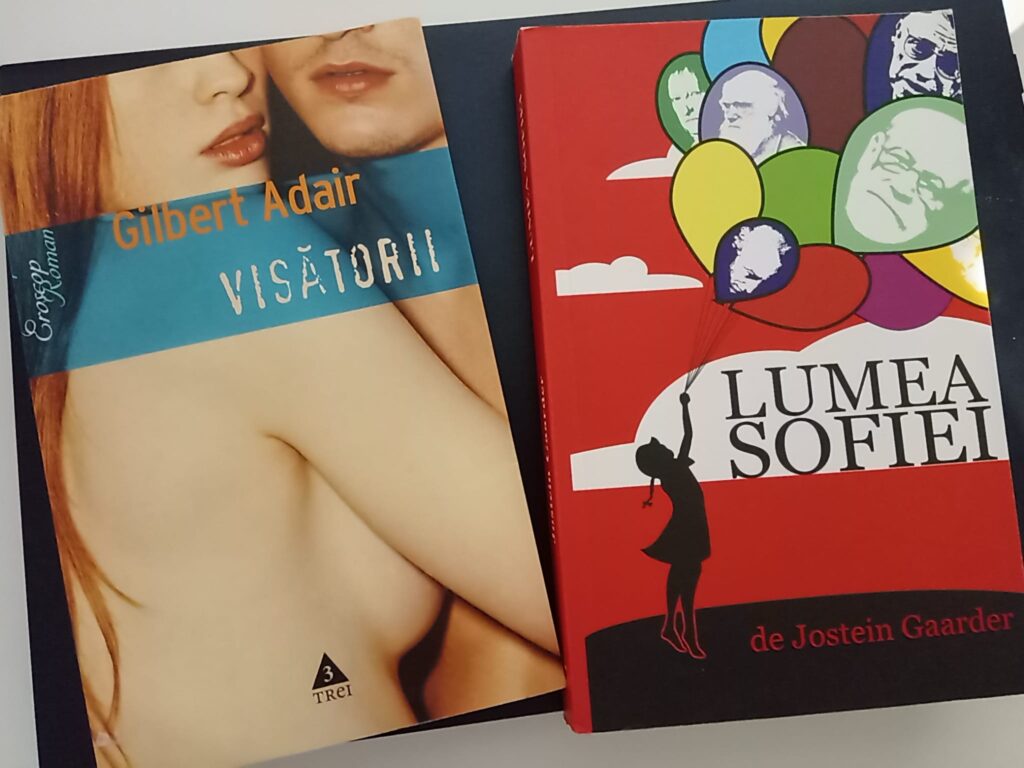
Is there any room left for creativity among all of these things? What is the peak of creativity at your job and
what is the project you are most proud of up until this point?
Even though I am now working in the businessy area of the book world, creativity plays an important role. It appears from time to time, especially in campaigns, where you can create some things and promote some of the books you believe in. It appears in the creation of new campaigns, such as the online bookfair Elefantfest, which we created in 2020, during the pandemic, and which was the first big online book fair. When all the physical book fairs had closed down, we though that it would be a good idea to bring the book fair feeling back, even during that period, when cultural events were scarce. Practically, we had to start from nowhere, because we had no blueprint to guide ourselves by. Everything was created from scratch, from across 6 kitchens, because we were all working from home, each one in their own neighbourhood. We spent hours in callsand we thought about how to arrange the booths of the publishing houses, how to work with the book launches, how to bring the books which had autographs, how each publishing house would promote itself within the book fair. Not only did we do something from scratch, but at the same time, we tried to be as efficient as possible (the point is to sell, this is the nature of the business).
And we wanted to create something beautiful, something you could be proud of later, because it is something you can emphasize and say “Look, I participated at the creation of this idea together with the team I am a part of.”
And was it successful?
Yes, it was successful, and it was very satisfying exactly because it happened during that period, when everybody was stressed, including us; something cool came out of it.
How do you keep up to date with the latest news from the publishing houses? Have you subscribed to their newsletters or do they send you things?
I must admit that I am a bit addicted to anything that has to do with new things, and, when I was younger, if you still remember, I had a perfectly stupid rule that I wouldn’t read dead authors. I was always
interested in what came out at that time, because otherwise, I thought that you couldn’t be connected to everything that was happening. Since then, I have read some of the dead authors, but I cannot say that I am caught up enough. Yes, I have probably subscribed to the newsletters of all the publishing houses, to the newsletters of other distributors...
The competition?
Including the competition, always. You must always have your eyes on them, you can’t just leave them like that. I read blogs from our country, for instance the blog ran by Laura Câlțea, who publishes monthly updates. But, at the same time, I simply follow all the publishing houses, I go on their sites, at least for the publishing houses which I constantly manage, and I look at everything which has to do with updates. I constantly read what is published overseas, I try to stay up to date with what is published in New York Times, The Bookseller, New Yorker, Publishers Weekly, Publishers Lunch, Literary Hub, Paris Review and other book reviews or book selling sites. Because I want to know in advance what will be interesting when it will be published in Romania. And when I see them in Romania I get excited. I say “Look, they published this one, let’s push it forward!” I consider it part of my job to read and to keep up with everything that is new. And I almost constantly read about new stuff. The classics are still a black hole for me.
What do you mean, didn’t you start reading Tolstoy?
Exactly, I told myself that my project for this year [2021] is to read War and Peace. And Tolstoy is watching me from my nightstand... He is judging me day and night. He sees me reading something which was released yesterday at God knows what publishing house and he gives me this look...
Coming back to the publishing houses, don’t they send you lists?
That, too. It works like this: when they have all the release dates of the books they publish, the publishing houses send you tables with the books listed for sale on the site. Some publishing houses will also send you what they will publish in the next few months. But, as I think you already know, it’s complicated with our Romanian publishing houses, because there are always various problems which interrupt the printing flows and they don’t really want to say what books they will publish in the next 6 months, because they have no certainty that those books will be released. But you find out things, as pointers at least. We also have meetings with the publishing houses every once in a while. It wasn’t the case during the pandemic, but we had physical meetings before with the commercial managers from the publishing houses we work with and we talked about the releases for the next period, especially before events such as Black Friday, where you have to decide upon the purchases and to know what will be released, in order to manage the sales in various campaigns.
What are the criteria according to which you select the books for sale?
We don’t say “no” to books. If a publishing house wants to list a certain book, we list it. The only selections we make are related to very specific books, such as textbooks, workbooks or titles with an unhappy historical baggage etc. Other than that, we list everything a publishing house has to offer.
Doesn’t this mean that your warehouse is occupied?
This is one of the advantages of having a big warehouse.
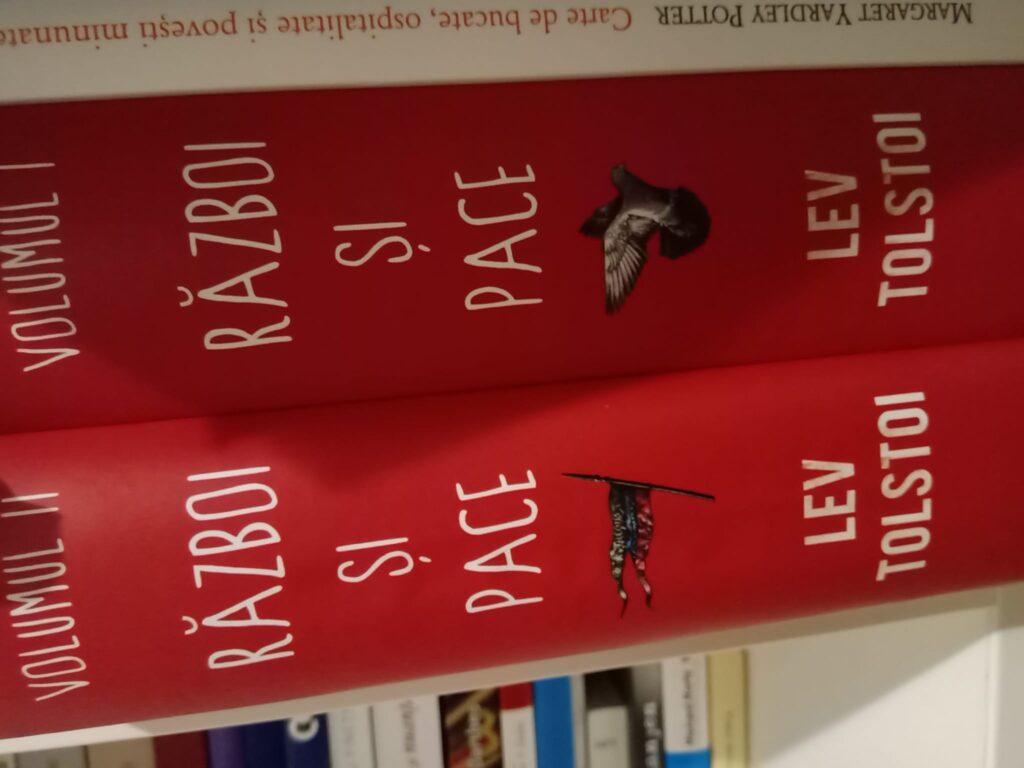
How do you complete a partnership with the newly emerged publishing houses? Do they come to you or do you discover them?
Both. But they mostly come to us. If someone starts a publishing house tomorrow, they will send us an email the day after that: “Look, I started a publishing house, I want to be on elefant”. We usually try to answer. Sometimes we also go to them. Once in a while, we go through publishing house lists, what is new and not listed on Elefant yet, and we contact them. I am sure that there are omissions. I went into a bookshop once and saw a book from a publishing house I liked and contacted it personally.
Such as?
The Pilot publishing house, for instance.
They didn’t contact you?
No. Every publishing house decides. For instance, there are publishing houses which do not want to be listed by a large distributor, because it implies some costs, and it is also a logistics thing, generally. You have to deliver large quantities to the warehouse, which is not located in Bucharest. Perhaps you don’t trust the online model, you’ve never had to deal with it before and you believe that it only brings immense discounts and that you’ll have to give up on some of your profit etc. There is reluctance from some of the publishing houses as well. If you go to them, you have a normal negotiation, you understand what they want, you know what you want and at some point you bring them to you. Pilot is on elefant now. They came to mind simply because I walked into a bookshop, I saw a book I had read about in The New Yorker, Barbarian Days, about surfing, which I also bought. I liked it a lot and I went to them, in order to bring the books on elefant, because I thought they were good books, which deserve a larger distribution.
I suppose that the sales, for which elefant.ro is famous, are not the only attraction mechanisms. What other marketing artifices work for you?
There are various types of campaigns. Whether we are talking about preorders, about exclusive deals (there will be books which only we will sell for a limited period of time, for two months, let’s say) from some publishing houses, 2+1 book for free, a free book as a gift for a certain amount of money spent, free shipping, advertising campaigns for a publishing house, a title, or an author. Giveawayson social media. Elefant has campaigns where there are some good prices, and, generally, we try to be more competitive when it comes to this. If a reader is specifically looking for this, if they want to find the best price, they will probably end up on elefant. But, at the same time, sales are no longer the main way in which we try to attract clients on elefant.ro. The titles are very carefully curated by my colleague, who is in charge of the campaigns. Those on the marketing team work in the classical marketing area, PR, digital marketing, YouTube. There is a wide variety of targeted campaigns, which have a lot to do with the e-Commerce area. We use the same toolsas the tools used for selling other products, adapted to a more special product, in order not to treat the books as any other product. Those of us who work with books don’t look at them as products, we do not think about them as merchandise. We are reluctant to talk about them as though they were merchandise. Even though it is a sort of merchandise; you are trying to sell it, your purpose is to sell as much as possible. But, because we all respect the object in itself, the book, we try to treat it as such. The job in itself is about selling as many books as possible, but it is also about putting as many good books as possible in the hands of as many people as possible.
What is the best sold book on elefant.ro and how many copies were sold?
I don’t know the exact numbers. But titles such as Atomic Habits, Rich Dad Poor Dad, The Subtle Art of Not Giving a F*ck, Ugly Love, The Silent Patient, The Book Thief. For Romanian authors: Irina Binder, Igor Bergler. Romanian children’s books authors such as Alec Blenche, Ioana Chicet-Macoveiciuc, Alex and Cristina Donovici. One of the best sold books on elefant ever is 100 Years of Solitude by Marquez. Elefant has sold thousands of copies of these books throughout time. But it’s very difficult to make a bestseller. There are few books which manage to do that. This is why you may see the same books in campaigns from one year to another, because the same titles continue to be sold. From time to time, one or two books appear, but, if you look at the tops, at everybody, not only at elefant, you’ll see the same titles. They do change, one year there is The Tattooist of Auschwitz, another year there is The Silent Patient, more recently When the Body Says No by Gabor Maté... Back in the day, so to say, it was Fifty Shades of Grey, Harry Potter... Those change, but they’re mostly the same.
Why do you think that is?
It’s something that has to do with the sales, because you’ll keep advertising a bestseller, given that it sells, and this is how it keeps selling. If you see that a book has sold 20.000 copies, you place it at the top, because it will keep selling 1.000 copies this month. You see that a book has potential, it starts selling very well, for one reason or another, either because of the popularity of the author, or because people are talking about it, and it creates a buzz, also taken on by social media, and it’s a trend. And you start placing it higher and higher until, at one point, it turns into a bestseller, because it starts selling in large quantities.
High in the tops you create?
In the selections for the campaigns we create. The same way in which, in a bookshop, a book can be placed on the shelves, or it can be placed on the table of bestsellerI worked in bookshops and I saw that the first place people went to was not the shelves, to look at the book spines, it was the bestsellers table, because they thought that if everybody read that book, then they must be onto something. Sales are a form of validation for the buyer, even though it does not always guarantee quality. So they bought bestseller, or they went to the section for newly published books, but those were the people who were up to date with the literary world. The bestseller promotes itself somehow only because it is a bestseller.
One of your long-term projects on elefant is promoting Romanian authors. What does this project entail and what are its results?
First of all, I try to follow all the new releases, including those in our country, the new Romanian authors collections, such as those from Nemira and Litera, the contemporary authors collections from Humanitas, Polirom. Romanian authors are constantly emerging, but it’s pretty difficult to sell Romanian authors from the perspective of a distributor, from a purely commercial perspective. Even from the perspective of a publishing house. The Romanian authors collections are an ambition of the publishing houses, they are not necessarily created because they expect them to sell tens of thousands of copies. It’s complicated. The Romanian authors who sell in large quantities, real bestsellers table, are the children’s books authors. Those who have somehow managed to build a platform, a community, and, with its support, to sell. I mentioned Blenche, Prințesa Urbană. Or for adults, Irina Binder, Igor Bergler. You can count them on the fingers of one hand. Or those who are already established authors: Mircea Cărtărescu, Liiceanu, Pleșu, Radu Paraschivescu, Ioana Pârvulescu and others of their caliber... So it’s quite difficult to sell Romanian authors. This is why it’s complicated to place debuting authors, who are less known, in campaigns, to promote them a lot, because when you build a campaign you invest some money: in marketing, in the space (a publishing house wants to promote certain titles, and if you place another title in their slot it’s as though you occupied a slot on a table of a title you know would sell and replaced it with something you know won’t sell that well). It’s complicated, but I somehow tried to constantly promote Romanian authors. Without hyperbolizing. I’m sure there’s room to do better. And I hope all the distributors will try to do more in the coming years. I am no specialist in Romanian literature, I’m just a reader. And I rely exclusively on the publishing houses’ recommendations. There is Citește românește, the Romanian authors book fair we are trying to promote constantly, where I made some selections, and where I try to always update the new releases, the bestsellers, the children’s books, non-fiction. Then, as new books are released, including books by debuting authors, I try to place them in campaigns, in newsletters. You’re almost trying to steal a slot, from time to time you find a way, and you place there some author or another that you really like. Moreover, in the online book fairs we tried to have as many book launches from Romanian authors as possible. Again, if you look at the numbers, you won’t sell a lot, but it’s more of a personal satisfaction, for me at least, and for my colleagues. Because you want to have a strong Romanian literature. There are bestseller some great authors and they need to have an opportunity to be noticed. Even when I worked in bookshops, I tried to place them on the shelves face-up, on the table for new releases and, if they made it there, on the bestsellers tabletable. I tried to put them in the hands of the people entering the bookshop and I try to do that on the site as well. To tell those who access the site: “Look, you don’t know who this person is yet, but take this and read it, I think you might enjoy it!”
And which ones do you enjoy?
Authors such as Bogdan Coșa, Lavinia Braniște, Radu Paraschivescu, Răzvan Petrescu. But the newer and older publishing houses collections are all the more enjoyable. The Romanian authors collections from Nemira, coordinated by Eli Bădică , already has a good portfolio, the one from Litera is moving, so is the collection from Humanitas, Trei does not have a collection, but it still publishes good authors quite often, Polirom is a constant of Romanian literature, but there are smaller publishing houses which are supporting poetry and prose, especially through debuts.
A novel you read recently?
I liked Cât de aproape sunt ploile reci/How close are the cold showers by Coșa.
You collaborate with numerous people from the publishing houses: marketing, communication, PR. What do these collaborations entail and what is a fruitful relationship based on?
We collaborate daily. I do not have only one publishing house, I have tens of publishing houses I deal with and I try to keep in touch as much as possible, because there are time constraints, related to what I actually have to do every day.
Do you also handle the payments and other financial stuff?
I manage the sales reports and the mediation of the payments. Then, with some people you also develop a personal relation (something you can create in time, because you interact every day), with some you simply have a professional relation, which goes very well, and you know that if you need anything, you can take care of that. With others it’s a little rocky, like it sometimes happens in life... But, usually, if something does not work, it’s business, and nothing else. You simply don’t have time, the other person doesn’t have time, you have something to do and you cannot take care of that, and so on. There’s no ill will on anybody’s part. As long as you get along well, it’s a win-win situation.
You also worked at physical bookshops, at Cărturești and Humanitas. How different are the two experiences and what are the differences?
The difference is Excel... The biggest difference is the relationship with the client. In the bookshop, you see the clients who come and talk to you: “I need something for my boss, for my mistress, for my second cousin, I haven’t seen her in a while, she was in Canada, now she’s back and I don’t know what to get her...” You try and give them a book which is tailored to their needs, and, at the same time, trick them into buying a better book than the one they had in mind. Here, online, you lose this thing, because you can’t see who’s buying the books. Elefant sold millions of books, but I don’t know who those people who are buying them, who access the site, are. Yes, you meet with Gigel and he tells you: “Dude, I saw that campaign, I got this thing for Black Friday, for Books50... And I gave it to my mother-in-law and now she thinks I’m much smarter...” But some of the magic is lost. Actually, this is the difference. I remember when I first started working at Cărturești AFI – I worked at Cărturești, but I actually worked in a mall, which takes away some of the magic. Given that I worked at bookshops, some of the charm worn off, but for me, bookshops have been and still are places I visit with great pleasure. Because to me, literature means more than just reading a book. It’s like a way of living. And it’s not only the stories in the books which are important to me, but also the object in itself. I also love the object and those who know me know that I cannot stand people who write on books, who take notes on them, who bend them. When I started working at Cărturești, I kept marvelling at that beauty, there was something magical in working at a bookshop. You only work with books, you work with people who are passionate about the same thing you are passionate about, even though they have different lines of work. But all of us gathered there, some more socially adapted, others less so, are trying to put these books in the hands of as many people as possible. Sometimes more politely, sometimes less so. Working in a bookshop is magical. Even though I remember very clearly how, after about a year of working there, I would roll my eyes whenever I heard someone coming in and saying “Oh, how pretty it is in here! I wish I worked here, because I’d read all day!” ... For anybody who doesn’t know this, when you work at a bookshop, you can’t sit there and read, because it’s apparently against your job, which is selling books. So it is magical, but at the same time, the magic goes away, it becomes a job. Especially because this happened during that period when we turned into sales advisors. Many of your initial ideas change, you become very cynical regarding the business. Especially when you find out about the small wages booksellers have. But, at the same time, I loved working in a bookshop. I stayed friends with some people from there. And I still enjoy going to the bookshop.

Are online bookshops the cause of the nightmares of physical bookshops?
No. And this is my own opinion, I am not the representative of elefant, I only work there on my site corner. From my point of view, living with this hunger mindset, thinking that if people buy from somewhere, they will no longer buy from the other place, or, that if you have a certain type of clients, there is no other type and you will die of hunger because someone stole your bread, is wrong. I don’t believe in this. I firmly believe that we must have a strong ecosystem, especially because our book market is very small in many respects. The idea is to create new readers... In a way, this is what the online medium does, because not everybody goes on elefant to buy books, they buy perfume, cosmetics, home decorations and “come on, let’s add some books to the cart”; this is how you create new readers, people you didn’t see buying books until then who start buying them online. They might go to a bookshop afterwards and also buy books from there... Their child goes in and says “Look, mommy, this book! I want to buy it...” and they buy it. There is room for everybody. Neither my team, nor I, see physical bookshops as our competition. We know very well that, to a certain extent, we share a segment of readers, of clients, with them, but at the same time, we don’t. Because there are some clients who say “I don’t want to shop online, I want to go to a physical bookshop for the experience” So, from my point of view, there’s no such thing. There is a different way of doing business, because the online medium is different from physical bookshops. The campaigns are not the same, the commercial mechanisms, the way in which you reach the clients is not the same... But, if you think about 2020... What the pandemic revealed was that the publishing houses, and not only the physical bookshop chains, found out that they cannot exist without being online. If they only used to invest a small percentage into the online shops of the publishing houses/the bookshop chains before, or in social media, in influencer reach , in more aggressive commercial policies, in sales on their sites, things have changed now. If people used to say “Online gives people huge discounts and it’s not ok”, after the pandemic, you went on their sites and they had the same sales as you, or even bigger ones. They figured out that the online medium isn’t going anywhere. It won’t disappear, whether you agree with it or not, online is both the present and the future. But this doesn’t mean that physical bookshops don’t play their own role. It means that the two will coexist for a long time, that they’ll have to bring new readers constantly, because the book market is small, and their purpose shouldn’t be to sell to the same people, but to try and create a book market which is as big as possible, where there is a lot of money, which should either be spent online, or in bookshops. The more we sell online, the more they sell on the boulevards and in malls, the better it will be for the publishing houses. Something else which 2020 revealed is that, when the physical bookshops went down, because of the context, the online medium took off a lot of that momentary weight and supported the publishing houses at that time through book fairs, through distribution, through sales. Which is very important, because we still see the ripples of what happened last year. Many publishing houses postponed books, they gave up on publishing them, or they will publish them after God knows how long.
And there are also the provinces, where you practically don’t have that many bookshops.
Exactly. Most of our clients, and this is the case for many others, are from Bucharest. And then from the big cities. You sell in Cluj, Iași, Brașov... But there are places where there are no bookshops, and the only option is the online medium, the delivery guy who knocks on your door and brings you a book; where the only option for a child to have a constant access to new books is, let’s say, the school library, and the online medium, where they can order from, if the parents are lucky.
It seems that some publishing houses consider elefant an enemy when it comes to the budget and the attention of the readers. But who is actually your most fierce competition?
We don’t think about it like that. We don’t think in the terms of actual competition, we think about how we could do better, bigger, more interesting things, which the competition will want to copy. Coming from bookshops, I was reluctant when I began working at elefant, but elefant does the same thing the publishing houses want to do – it sells as many books to as many people as possible. Whether we do it through sales, social media, or God knows what other campaigns, we have the same objective as everybody else. The more we sell, the more money goes to the publishing houses. The more we raise the number of readers who have easy access to books, the more the number of readers increases for the bookshops. If there was anything that 2020 emphasized, it’s that without online, whether it’s us, whether it’s the direct channels of the publishing houses, you cannot exist anymore. You cannot really exist, as a publishing house, without concentrating on and constantly taking the online medium into account, because it has become a significant chunk of the revenue. And it has also become a significant chunk of the revenue for the bookshop owners. From our point of view, the more good competition we have on the market, the more it motivates us to do more interesting things, to try to outdo ourselves; and, the more money goes towards the publishing houses, which, from my point of view, is a good thing. This is my job. If I do my job well, it’s not about me, I don’t get anything out of this, everything that happens is that more money goes to that publishing house. And the more money a publishing house receives, the more what interests me as a reader happens (I work there, but I am a reader first and an elefant buyersecond): the publishing houses can release better titles more often, more up to date. It somehow creates a professionalism in the publishing houses and an expectation from them to have a good enough portfolio to be able to showcase it online; and physically, to be as up to date as possible with what is released overseas. Another good part of the online medium is that on elefant, for instance, you can buy all those books in English, we have a foreign books category, where you can get almost any book in just a few weeks.
Then there is another thing. I believe that the online medium has created very high expectations regarding the importance of covers. Before, a cover was beautiful, you saw it in a bookshop and you thought it was pretty. Perhaps you saw it on a table and it caught your eye, but it didn’t really matter. Online, however, a cover can make or break a book. Because you see the cover first. And many times, the cover is the only thing you see. So the graphic designfield has also developed, people are starting to invest in it and you can see a big difference compared to how it was a few years ago.
Let’s say that you received a reading residency in France. Which books would you bring with you, which would you leave in the shade of the castle, and which would you bring back home?
Usually, about two weeks before I go on vacation, I start asking myself: “What books do I take with me to read on vacation?” This caused the following event to happen: I went on a hike and I took Hilary Mantel’s Wolf Hall with me, which is a brick, and everybody said I was crazy. So for me, what I take with me to read somewhere is very important. If I were to take books I have already read and loved, it would be Zadie Smith’s White Teeth . Then, a rediscovery of the literary world and a personal rediscovery, Stoner Stoner by John Williams, the book I recommend most often. I would take, maybe, one of the books which made me love literature, 100 Years of Solitude. Sandman by Neil Gaiman, and any book from Terry Pratchett’s Discworld series, for the pure pleasure of reading masterfully told stories. Hemingway’s Fiesta , which is responsible for my (and for many other people’s) wish to go to France, Tenth of December by George Saunders, published at Black Button Books in Romania, for the ingenuity, Naked by David Sedaris from Publica for the humour, Franzen’s Freedom for reading on the way and Houellebecq, because the French cultural ego is not something you want to mess with. And now I’ll shut up and stick some socks in the luggage, not only books.
[Interview recorded and transcribed by Lucia Alexandra Brînaru.] [Translated into English by Irina-Adelina Găinușă.]
Photos: Vlad's personal archive

